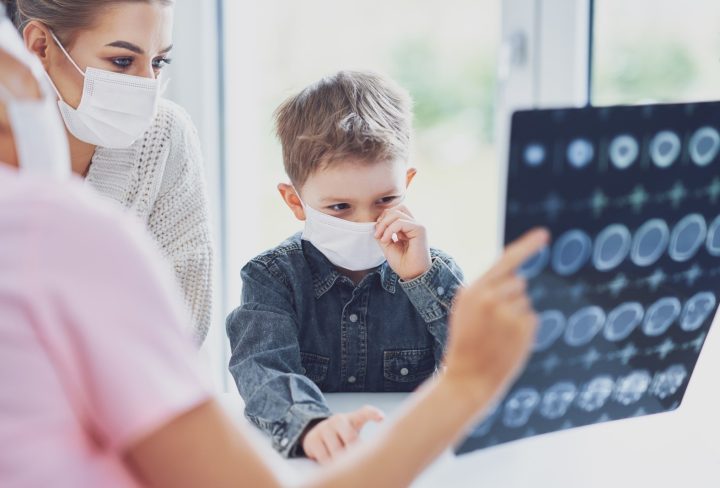Pediatric brain tumors are abnormal cell masses that can grow in any part of a child’s brain. There are different types of brain tumors, and they can be non-cancerous (benign) or cancerous (malignant).
Some pediatric brain tumors can cause long-term impairment of intellectual and neurological function. Brain tumors in children and infants are very different from adult brain tumors.
Symptoms of brain tumors in children
Depending on the type and the part of the brain affected, your child may experience symptoms like:
- Expanding head size in infants
- Problems speaking clearly, swallowing, or walking
- Vision problems, such as blurred or double vision
- Trouble with schoolwork
- Frequent headaches
- Recurrent vomiting
- Slurred speech
- Seizures
- Coordination or balance difficulties
Many of these symptoms can mimic other health problems making it difficult to diagnose a brain tumor.
What Increases Your Child’s Risk for a Brain Tumor?
The cause of brain tumors in children is still unclear. Factors increasing the risk of brain tumors include:
- Gene abnormalities
- Exposure to radiation
- Parents of children exposed to certain chemicals.
- Cancer that spreads to the brain
- A weakened immune system
Brain tumors are the most common cause of cancer in children.
How is the diagnosis of brain tumors made?
Your doctor will perform a physical examination, ask about symptoms and family history of brain tumors or cancer.
Tests include:
- A neurologic exam – To know the functioning of your child’s brain
- X-ray, MRI, or CT scan – To see the size and location of tumors
- PET scan – To see the spread of tumors
- Biopsy – To know whether the tumor is cancerous or noncancerous
An accurate diagnosis is essential to develop a personalized treatment plan.
Treatment for Brain Tumors in Children
- Medicines- Lower your child’s risk for seizures and reduce swelling
- Surgery- Surgery aims to remove the tumor completely
- Chemotherapy- These are medications to kill the cancer cells or stop them from growing
- Targeted therapy- These are medicines that focus on specific parts of cancer cells
- Radiation therapy- Involves the use of high-energy X-rays or other radiation to kill cancer cells or arrest their growth
Regular post-operative follow-up visits with the pediatric neurosurgeon are essential for monitoring neurological function and side effects from treatment.

